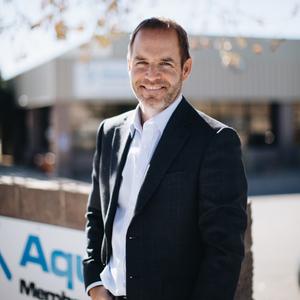
Innovation can take root anywhere, whether it's in a lab at a tier-one research university or a coworking space within a booming West Texas border city. This year's Inno Under 25 class proves that — and then some.
Each year, Albuquerque Business First and New Mexico Inno look for young startup founders, novel researchers or other folks working to advance the state's growing innovation ecosystem. Through a public call for nominations and our own individual outreach, the editorial team selected five individuals for this year's group of Inno Under 25 honorees. To qualify, those chosen had to be 25 years old or younger as of Oct. 13, 2023 (the date of this publication).
While previous iterations of our Inno Under 25 awards have picked people based primarily in and around the Albuquerque area — which is not surprising as the Duke City is by far the state's largest city — Business First looked a bit farther south for this year's class. A couple of our honorees base their work in the Borderplex region, which spans from El Paso, Texas, to Las Cruces, and another has pioneered research at the New Mexico Institute of Mining and Technology in Socorro.
But don't worry. Albuquerque — and the University of New Mexico, specifically — is still well represented.
You can read all about those five honorees in the Oct. 13 print edition of the the paper, or in the coming days online.
Think battery technology has somehow been perfected? Chris Fetrow wants you to think again.
The Albuquerque native and University of New Mexico (UNM) doctoral student dove headfirst into battery-related research while at UNM. Getting into such research was "a bit of a chance event," he told Albuquerque Business First.
That's because the research group he was a part of while an undergraduate student at UNM didn't have additional funding for graduate student research.
So, Fetrow had to venture out and find a new professor to conduct research with as a doctoral student. He found that professor when Shuya Wei, Ph.D., an assistant professor in UNM's Department of Chemical and Biological Engineering — who would later become his Ph.D. advisor — reached out to him.
Wei's research background is in chemical engineering and bioengineering, at Cornell University and Singapore's Nanyang Technological University. In recent years, her research has focused on the technology behind the aluminum CO2 batteries.
"She asked if I wanted to work in her lab, and I said, 'Yeah, that sounds good,'" Fetrow said. "Then she asked which project I wanted to work on, and I picked the aluminum CO2 one because I thought it sounded interesting."
Aluminum batteries, which Wei and Fetrow have been researching, could provide an alternative to the more common lithium-ion batteries found in everything from laptops to cell phones to electric vehicles. Those batteries use what Fetrow called a "circumvention" to operate for a long time and return a very large amount of stored energy.
But lithium-ion batteries come with some problems. Lithium is quite hard to come by, making those batteries increasingly expensive, and they're liable to catch fire because of the circumvention method Fetrow mentioned.
While existing battery alternatives may avoid that circumvention, or "trick" as Fetrow called it, they're usually more difficult to recharge, don't return as much stored energy or have shorter lifespans. Fetrow's aluminum CO2 battery concept could solve those problems, he said.
A lithium-ion battery, for instance, returns over 99% of the energy put into it. Other alternatives might return 50 to 60%; Fetrow said he and Wei's aluminum-based battery is "up to 95%."
"We went on a bit of a side path from where a lot of the current research is," Fetrow said. "Using aluminum is one of those side paths. And then the other side path is how we're attempting to solve the problem that I've talked about pretty generally.
"In combination, it seems to work really well — surprisingly well," he added.
Another benefit of Fetrow and Wei's aluminum batteries? They can function as direct air capture devices.
That's because the pair of researchers picked carbon dioxide to use as the other chemical in their battery design. Using CO2 means carbon dioxide can dissolve into a liquid part of the battery and react with the aluminum to make a solid while releasing energy, and then while charging the CO2 can release from the solid and be captured as a more concentrated version.
It's all pretty technical stuff. The important part is that Fetrow wants to take he and Wei's research and turn it into a successful, commercial company.
He's done that by partnering with Tom Chepucavage, a more seasoned businessperson, to launch Flow Aluminum, an Albuquerque-based startup built around the aluminum battery technology. The startup, founded in May, has picked up some quick traction, closing a $20,000 early investment round and being accepted into an accelerator program at New Mexico State University's Arrowhead Center.
Fetrow himself has participated in a slew of pitch events, including one at UNM and one held in New York. The University of Michigan CO2 Initiative also recently selected his battery technology for its Techlab program.
Business First caught up with Fetrow to dive a bit more into his startup, his approach to innovation and his plans going forward.
The interview was edited for brevity and clarity.
Albuquerque Business First: What is the biggest challenge Flow Aluminum could have in actually scaling the batteries in a way that makes them commercially viable and attractive to not only drones but also larger customers?
Chris Fetrow: The big thing is that how the batteries are made right now was designed to be something that can be easily done successfully many times in a research lab. However, a research lab doesn't really mind if someone spends a lot of time on each battery and doesn't really mind if each battery is small. So, we will need to change how our batteries are made.
How do you think about innovation? Obviously, the research that you're doing is inherently innovative, but how do you think about innovation more broadly [with] the work that you're doing? I think it's necessary. I really hope, unselfishly, that we're not the only people who are successful. Because the world needs better batteries. The world needs better direct air capture.
You're not worried if other people are trying to innovate in the same space, necessarily? There's always a sort of conflict, because as a startup co-founder, it's my job to say I want us to be the successful ones. But I'm also a human living on this planet, and I just want these problems solved.
If you look at yourself five years down the road, where do you picture yourself? Do you have a very clear laid-out path forward for yourself or the startup? Do you have a big career goal that you're working towards? I don't have a big plan for myself. You may notice from my previous achievements that I tend to go where things take me. I would like to be working with the startup because I would like the startup to be successful and I'm the subject matter expert on the batteries, and so the startup being successful very likely means I will still be there. I'd be happy with that.









